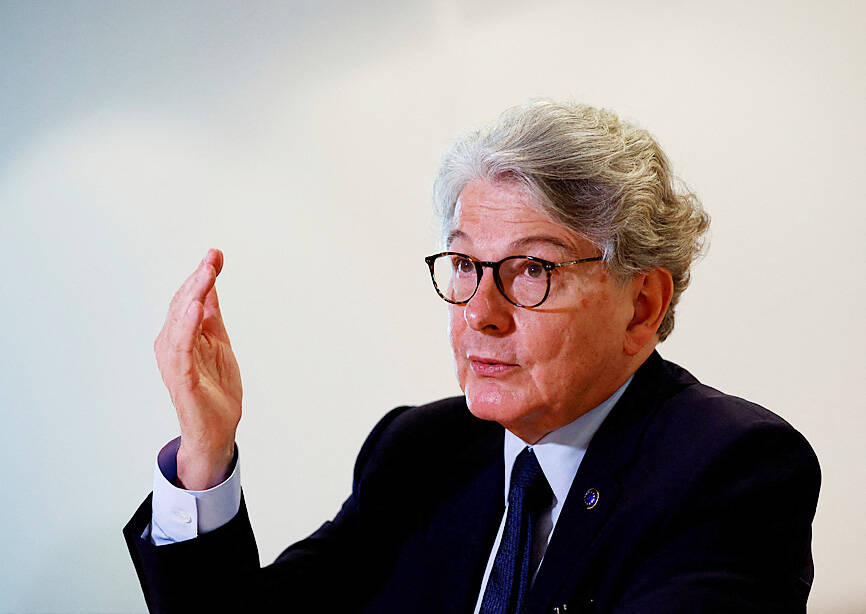Japan and the EU agreed to step up cooperation on semiconductors a day after China unveiled export restrictions on two metals crucial to some parts of the chip industry, adding to tensions in a global technology trade war.
The two sides agreed to an “early warning” system on problems in the chip supply chain in a memorandum that was to be signed by Japanese Minister of Economy, Trade and Industry Yasutoshi Nishimura and European Commissioner for the Internal Market Thierry Breton at a meeting in Tokyo yesterday.
China’s announcement of new controls on gallium and germanium, which are used in the semiconductor, telecommunications and electric-vehicle industries, is the latest reminder of vulnerabilities in the chip supply chain.

Photo: Reuters
Beijing says its export controls are in accordance with law and are not targeted at any specific country, Chinese Ministry of Foreign Affairs spokeswoman Mao Ning (毛寧) said yesterday.
The US, Japan and EU members are among the governments aiming to bring more chip production home to bolster resilience and restrict some related exports to China. They are also working to shore up ties with a broader range of partners.
The pact outlines plans for information-sharing on government subsidies as well as cooperation on research and development of next-generation chips and developing human resources.
Japan in May agreed to deepen cooperation with the US on advanced semiconductor research.
Japan is funneling billions of dollars into subsidizing domestic semiconductor ventures backed by Taiwanese, Japanese and US firms, as well as backing a buyout of JSR Corp, a world leader in manufacturing chipmaking compounds.
Nishimura yesterday said that Tokyo would watch how China implements planned export restrictions on germanium and gallium and seek answers on the intent behind the move.
“If any measures are unfair toward Japan in light of international rules such as those under the WTO, we will act accordingly,” Nishimura told reporters at a regular news conference.
Tokyo does not consider China’s curbs as a reaction to Japan shoring up its licensing requirements on chipmaking equipment, he said.
In Taipei, the Ministry of Economic Affairs said the short-term effect of China’s export controls on germanium and gallium would not be significant.
Taiwan is monitoring the effects on global markets of long-term controls, as well as price fluctuations and supply issues, Minister of Economic Affairs Wang Mei-hua (王美花) said yesterday, adding that China exports unrefined products that are refined in countries such as the US and Japan, and Taiwan imports the refined products.
A senior South Korean official also said the short-term effect of China’s export controls would be limited, offset by a government stockpile and alternative supplies.
“We are monitoring the situation in key countries such as the US and Japan, and will make utmost efforts to prepare measures to deal with even unlikely situations,” the South Korean Ministry of Trade, Industry and Energy’s Deputy Minister for the Office of Industrial Policy Joo Young-joon said.
Additional reporting by Reuters

Quanta Computer Inc (廣達) chairman Barry Lam (林百里) is expected to share his views about the artificial intelligence (AI) industry’s prospects during his speech at the company’s 37th anniversary ceremony, as AI servers have become a new growth engine for the equipment manufacturing service provider. Lam’s speech is much anticipated, as Quanta has risen as one of the world’s major AI server suppliers. The company reported a 30 percent year-on-year growth in consolidated revenue to NT$1.41 trillion (US$43.35 billion) last year, thanks to fast-growing demand for servers, especially those with AI capabilities. The company told investors in November last year that

United Microelectronics Corp (UMC, 聯電) forecast that its wafer shipments this quarter would grow up to 7 percent sequentially and the factory utilization rate would rise to 75 percent, indicating that customers did not alter their ordering behavior due to the US President Donald Trump’s capricious US tariff policies. However, the uncertainty about US tariffs has weighed on the chipmaker’s business visibility for the second half of this year, UMC chief financial officer Liu Chi-tung (劉啟東) said at an online earnings conference yesterday. “Although the escalating trade tensions and global tariff policies have increased uncertainty in the semiconductor industry, we have not

Intel Corp has named Tasha Chuang (莊蓓瑜) to lead Intel Taiwan in a bid to reinforce relations between the company and its Taiwanese partners. The appointment of Chuang as general manager for Intel Taiwan takes effect on Thursday, the firm said in a statement yesterday. Chuang is to lead her team in Taiwan to pursue product development and sales growth in an effort to reinforce the company’s ties with its partners and clients, Intel said. Chuang was previously in charge of managing Intel’s ties with leading Taiwanese PC brand Asustek Computer Inc (華碩), which included helping Asustek strengthen its global businesses, the company

Power supply and electronic components maker Delta Electronics Inc (台達電) yesterday said it plans to ship its new 1 megawatt charging systems for electric trucks and buses in the first half of next year at the earliest. The new charging piles, which deliver up to 1 megawatt of charging power, are designed for heavy-duty electric vehicles, and support a maximum current of 1,500 amperes and output of 1,250 volts, Delta said in a news release. “If everything goes smoothly, we could begin shipping those new charging systems as early as in the first half of next year,” a company official said. The new